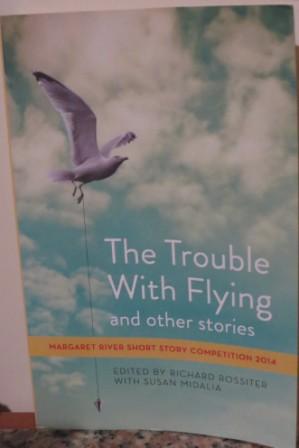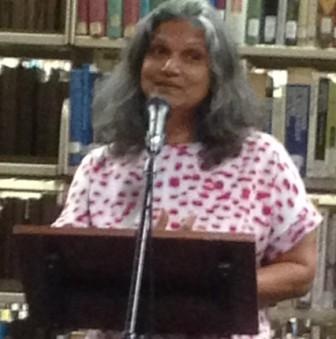With the busy lives people now live, short stories are more popular than ever. Reading a novel is a commitment that many people find they often just don’t have the time to commit to, whereas a short story is a lot more doable, offering a satisfying read in a relatively short time.
Margaret River Press is currently running a short story competition and as a result of that will publish their fourth anthology since the company’s inception in 2011.
Bunbury readers and writers enjoyed an evening of literature over a glass of wine at ECU library on Thursday night where they met with authors of recently published anthology The Trouble With Flying and other stories. Short story writers Rachelle Rechichi, Leanne Browning and Leslie Thiele read from their prize-winning stories and spoke of the background and what inspired them to write.
Special guest and competition judge and writer Richard Rossiter, addressed the audience talking about what makes a great story, offering valuable tips to new and would be writers. Such advice included: don’t over write, don’t use too many adjectives, have a consistent point of view and show rather than tell.

He also highlighted the importance of the writers voice and said not to be afraid to experiment with point of view and that limited third person point of view can be a good way to establish character, while also allowing the writer to comment. ”A good writer’s voice is marked and idiosyncratic and that will hook a reader into a piece of writing”, Rossiter said.
When judging short stories he said he narrows them down and once short listed he leaves them for about a week and then when he goes back to them, he thinks about which ones have been memorable, which ones stayed with him and which ones moved him. ‘The essence of a short story a compressed piece of writing that moves the reader’, he said.
Sometimes writers will write for years without having an audience, such as Elizabeth Jolley who wrote for twenty years before being published and having an audience. So sometimes it can look like an author has, incredibly, written three or four books in a couple of years, when in actual fact they have been working on them for twenty.
For some of the writers, undergraduate students at ECU, their stories stemmed from writing exercises they had done during their writing course and were based on their own experience growing up in the world. Rossiter said most first works produced by writers are autobiographical, it is often necessary to write that out and finish it before the writing can continue.
There is still time for writers to enter the short story competition for which the closing date is 16 October 2014. Carolyn Wood from Margaret River Press said they hope to discover new talent from a diverse cross range of people. For more information go to: http://margaretriverpress.com


Hi Ingrid. I can’t BELIEVE I’m reading this today, of all days. I’ve just been pondering how to tell everyone (in only FIVE minutes!) about my idea for a novel which just popped into my head…. I’ve been thinking of you, my other lovely Penguin Club Friends (from whence the 5 Min Speech inspiration came), and here you are with so many hints/tips and GREAT ideas to help me, not just with a 5 Min speech, but for my future/career as a writer, too! Sorry, I KNOW it’s not all about ME, too! I always enjoy reading your (and other people’s) blogs, but this one is incredibly well timed! Keep up the good work, and I look forward to reading your next post!
Thank you so much for your comment Catherine … I’m so glad the post was helpful and / or inspirational. It’s encouraging to know. Looking forward to Monday.
Jo Castro, blogger extrordinare says:
“What a wonderful literary evening it was offering hope and inspiration for unpublished authors and writers keen to advance their writing output. It was great to meet ECU lecturers and listen to the competition judge spell out what he felt made a winning story, as well as to meet Margaret River Press representatives too. I hope there will be more events like this, and that we can rely on you Ingrid to report on them afterwards – and remind me of things that my senior brain had forgotten already 😉 “
Thanks so much for your comment Jo … It was a great evening – I wished I could have stayed longer.